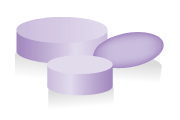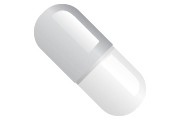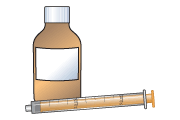Melatonin for sleep disorders
This leaflet is for parents and carers about how to use this medicine in children. Our information may differ from that provided by the manufacturers, because their information usually relates to adults. Read this leaflet carefully. Keep it somewhere safe so that you can read it again.
Name of medicine
Melatonin is available in a range of branded products.
Brands include: Circadin® (modified-release tablets) and Slenyto® (prolonged-release tablets)
This leaflet is about the use of melatonin to help children who have difficulty getting to sleep at the start of the night.
Why is it important for my child to take melatonin?
Poor sleep can affect your child’s physical health, mood, behaviour and development. Melatonin may help your child to get into a regular sleep pattern.
What is melatonin available as?
Modified-release tablets (Circadin): 2 mg contain lactose
Prolonged-release tablets (Slenyto) 1 mg, 5 mg contain lactose
Tablets and capsules from 0.5 to 5 mg (these have to be ordered specially by your pharmacist)
Liquid medicine: 5 mg per 5 mL (this has to be ordered specially by your pharmacist)
When should I give melatonin
Melatonin is given once a day, between half an hour and an hour before your child’s agreed bedtime.
Give the medicine at about the same time each day so that this becomes part of your child’s daily routine, which will help you to remember
How much should I give?
Your doctor will work out the amount of melatonin (the dose) that is right for your child. The dose will be shown on the medicine label.
Your doctor will probably recommend that your child has a low dose to start with. They may then increase the dose until your child’s sleep problems have improved. Normally, the dose will not be more than 10 mg per day.
It is important that you follow your doctor’s instructions about how much to give.
How should I give melatonin?

Modified-release tablets (Circadin)
Tablets should be swallowed whole unless your doctor or pharmacist has told you otherwise. Your child should not chew the tablet. Sometimes, your doctor or pharmacist may tell you to crush it – this will make it act faster, but the effect will not last as long.

Prolonged-release tablets (Slenyto)
Tablets should be swallowed whole unless your doctor or pharmacist has told you otherwise. Your child should not chew the tablet. The whole tablet can be put into a small amount of soft food such as yogurt or ice-cream. Make sure your child swallows it straight away, without chewing.

Other tablets and capsules
Other tablets and capsules should be swallowed with a glass of water, juice or squash. You can crush the tablet or open the capsule, and mix the contents with a small amount of cold or room temperature soft food such as yogurt or jam. Make sure your child swallows it straight away, without chewing.

Liquid medicine
Measure out the right amount using a medicine spoon or oral syringe. You can get these from your pharmacist. Do not use a kitchen teaspoon as it will not give the right amount.
When should the medicine start working?
Your child should feel sleepy about 30 minutes to an hour after taking a dose of melatonin.
What if my child is sick (vomits)?
If your child is sick less than 30 minutes after having a dose of melatonin, give them the same dose again.
If your child is sick more than 30 minutes after having a dose of melatonin, you do not need to give them another dose that night.
If your child is sick again, seek advice from your family doctor, pharmacist or hospital.
What if I forget to give it?
If you miss a dose and your child is already asleep, wait until the next day and give the normal dose as usual. If your child is still awake, give them the normal dose.
What if I give too much?
If you think you may have given your child too much melatonin, contact your doctor or local NHS services (details at end of leaflet). Have the medicine or packaging with you if you telephone for advice.
Are there any possible side effects?
We use medicines to make our children better, but sometimes they have other effects that we don’t want (side effects).
Side effects you must do something about
Rarely, melatonin can cause problems with your child’s heart. If your child develops chest pain or has a fast heart rate (they may have a fluttering feeling in their chest or feel their heart beating quickly), contact your doctor straight away or take your child to hospital.
If your child seems very unwell in any way that is unusual for them and you are concerned, take them to hospital.
Other side-effects you need to know about
Your child may feel dizzy or nervous, or may have stomach pain.
Your child may develop a rash or itch.
There may sometimes be other side effects that are not listed above. If you notice anything unusual and are concerned, contact your doctor. You can report any suspected side effects to a UK safety scheme at mhra.gov.uk/yellowcard
If you are concerned about any of these side-effects contact your doctor.
Can other medicines be given at the same time as melatonin?
- You can give your child medicines that contain paracetamol or ibuprofen, unless your doctor has told you not to.
melatonin should not be taken with some medicines that you get on prescription. It is important to tell your doctor and pharmacist about any other medicines your child is taking before starting melatonin.
Check with your doctor or pharmacist before giving any other medicines to your child. This includes herbal and complementary medicines.
Is there anything else I need to know about this medicine?
Treatment with melatonin is usually started by a specialist.
A specialist may suggest that your child takes melatonin if they need to have a scan that requires them to lie still for a while.
General advice about medicines
- Only give this medicine to your child. Never give it to anyone else, even if their condition appears to be the same, as this could do harm.
- Make sure that you always have enough medicine. Order a new prescription at least 2 weeks before you will run out.
- Make sure that the medicines you have at home have not reached the ‘use by’ date on the packaging. Give old medicines to your pharmacist to dispose of.
If you think someone else may have taken the medicine by accident, contact your doctor straight away.
Where should I keep this medicine?
- Keep the medicine in a cupboard, away from heat and direct sunlight.
- You may need to keep liquid medicine in the fridge – check the instructions on the bottle. Make sure the medicine does not freeze.
- Make sure that children cannot see or reach the medicine.
- Keep the medicine in the container it came in.
Who to contact for more information?
Your child’s doctor, pharmacist or nurse will be able to give you more information about melatonin and about other medicines used to treat sleep disorders.
England: NHS 111
Tel 111
www.nhs.ukScotland: NHS 24
Tel 111
www.nhs24.scotNorthern Ireland: NI Direct
Wales: NHS 111 Wales
Tel 111
www.111.wales.nhs.ukCopyright disclaimer
Version [3]. © NPPG, RCPCH and WellChild, all rights reserved. Review by February 2020.
The primary source for the information in this leaflet is the British National Formulary for Children. For details on any other sources used for this leaflet, please contact us through our website, www.medicinesforchildren.org.uk.
We take great care to make sure that the information in this leaflet is correct and up-to-date. However, medicines can be used in different ways for different patients. It is important that you ask the advice of your doctor or pharmacist if you are not sure about something. This leaflet is about the use of these medicines in the UK, and may not apply to other countries. The Royal College of Paediatrics and Child Health (RCPCH), the Neonatal and Paediatric Pharmacists Group (NPPG), WellChild and the contributors and editors cannot be held responsible for the accuracy of information, omissions of information, or any actions that may be taken as a consequence of reading this leaflet.
